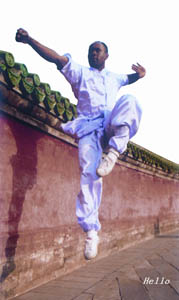
"Wushu should have been included in the Olympic Games much earlier," says 22-year-old Englishman Richard Johnson in Chinese.
Johnson, whose Chinese name is Sha Le, had been practicing martial arts for five years before he came to China two years ago. He used to be the gym champion in middle school and later a football player in college; now he is a local kungfu master.
Johnson said he was aware that wushu appears for the first time in the Olympic Games as a special sport: neither for competition nor for demonstration performance. "But it is still a big step for the martial art," he noted.
According to Johnson, wushu can help build stamina health and promote self-defense. It is suitable for all ages and is a competitive sport.
The Olympic Games have 26 sports from the West and only two from Asia: kickboxing and karate. It was a pity that China did not have any sport indigenous to it included in the Games, said Johnson. "Wushu, in fact, is the root of both kickboxing and karate," he added.
But he agreed with the principle that for a sport to be included in the Olympics, it had to be universal. "To make wushu a regular and formal item of the Olympic Games, China needs to do more to promote and popularize it worldwide," he said.
Wushu has, in fact, been undergoing standardization to meet the requirements of competition. But Johnson said he personally preferred the various distinctive wushu forms. "Of course I can't learn all of them …I may never get to the core of this art," he said.
"Currently wushu is more about performing than competing, and this is something to be worried about," said Nick Barton, a kungfu artist from the U.S. Nick has been learning kungfu in China for six years and is considered an old hand at the martial art. Quoting Ou Muhua, a Chinese columnist that "it is a failure and even a profanity to the spirit of wushu if it makes its way to the Olympic Games as an ornamental event,'' Nick said based on the successful experience of kickboxing and karate, wushu must be included in the Games as a competitive sport. But this need not mean dumping its ornamental feature, he said. "Wushu's ornamental beauty can be showcased during the competition. It is this beauty that makes it better than kickboxing and karate," he said.
Nick mainly practices taijiquan, a kind of traditional Chinese shadowboxing. "I think it's so beautiful," he said. After trying his hand at all kinds of sports, he found that the taijiquan suited him the best. "You have to have a competitive rival so that the tennis can be fun; you need to have a pool to swim, but you need nothing to play taijiquan, any time and any place. Taijiquan is a kind of an exercise that is not just about burning calories. There is also some philosophy to it,'' he enthused.
Long journey
"I found wushu approachable,'' said Luc Bendza from Gabon, who has a Master's degree in wushu from the Beijing University of Physical Education. He came to China when he was 14 and has lived here for more than 20 years. He has won several wushu competitions and is now president of the Gabon Wushu Association, a member of International Wushu Federation and is expected to referee wushu events during the 2008 Games.
Bendza first saw wushu on screen and made his mind to study real kungfu in China. His first teacher was a Chinese translator in Gabon. "When I was 14, I couldn't wait to go to China to pursue the martial art," he said. The young man's resolution did surprise his mother but she finally relented as one of Bendza's uncles worked in China.
In 1984, Bendza learnt wushu for a year at the Shaolin Temple. It was a tough time, he recalled. Every morning, he had to exercise by carrying two buckets of water with his arms stretched straight out. "But it was worth all the pain,'' he said.
| 